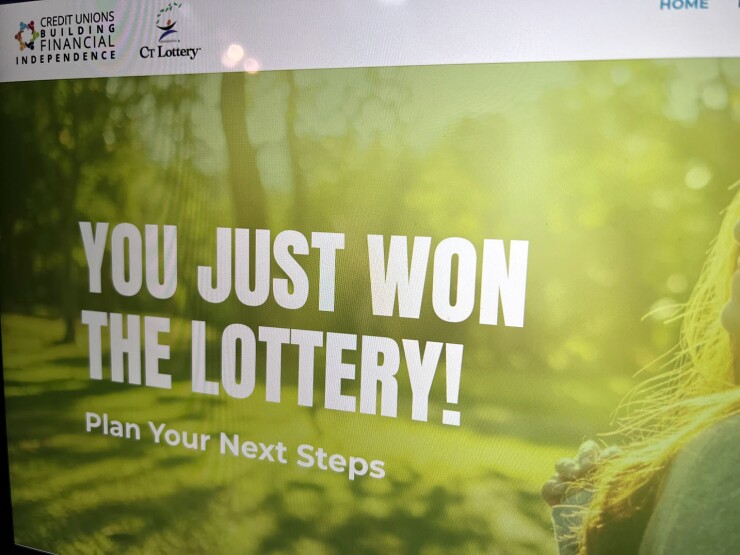The tales of lottery winners that strike it rich one day and are seemingly broke the next are so common today that they have almost become folklore.
"We have heard stories like that," Connecticut Lottery Corp. Chairman Robert Simmelkjaer said. "One thing we do know is that when people win large sums of money in the lottery it is sort of a financial shock."
So the Credit Union League of Connecticut and the Connecticut Lottery are joining forces to do something about it. The two organizations recently unveiled a program called Wise Winnings that will offer free financial advice to lottery winners.
Connecticut lottery players who win $600 or more will receive an informational brochure about the program when they pick up their prize check. They will be able to meet with a trained credit union financial counselor to create a plan for their money, and a

Winners often don't know what to do with the money and thus can make bad decisions, according to Simmelkjaer. So the group thought it could help by giving those winners some resources, he said.
The program is an extension of the Lottery's responsible gaming initiative. "If someone wins $10,000 in the lottery and then gives it all right back to us, is that really a good outcome?" Simmelkjaer said. "My answer is no."
More than 30,000 people win prizes of $600 or more in the Connecticut lottery each year, Simmelkjaer said. There were 30 people in the state who won at least $500,000 last year.
The program is the first of its kind in the U.S., according to the two groups, and a few other states have already reached out to learn how the program works so that they could possibly create one of their own.
The program provides the state's credit unions a chance to serve overlooked and vulnerable populations that might be victimized by people who want to exploit them for their winnings, Credit Union League of Connecticut President and CEO Bruce Adams said.
Wise Winnings strikes at the core purpose of credit unions — serving people of modest means — and the program will help bring attention to that mission for a larger swath of the state's population, Adams said.
"You don't want them spending it all on the way home before they stop and take a breath," he said. "Of course you want to treat yourself, you've always wanted that red Cadillac. We want to help you get that car but maybe not pay cash for it."
People tend to turn to credit unions during a time of distress, and Simmelkjaer said winning the lottery can fall into that category too.
"We know that there are people in our player base who need these services, and they need them most at the time when they come into a large sum of money," he said.
So why partner with credit unions in the states and not the banks? Simmelkjaer said the Lottery decided credit unions were a better fit because they are nonprofit, and the Lottery did not want to be seen as bestowing a business opportunity on for-profit companies.
Additionally, "credit unions operate in every corner of the state including some areas where there might not be quite as much bank presence," Simmelkjaer said. "We know there are lower-income areas where credit unions operate."
The program's primary mission is interrupting the spending impulse and giving people the luxury of time to find the right advisor, Adams said.
"You're not going to teach people to be a good, rational financial actor when they're picking up a check for a bunch of money," Adams said. "But if you win a million dollars, maybe you should start by parking your money somewhere and looking around."






